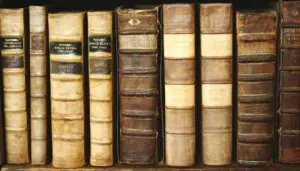 A used or rare book, like any other collectible, is worth only what someone else is willing to pay for it. Value is a funny thing. How much you can charge for any manuscript is personal and changes based on collector demand for the item. If you want to buy or sell rare books, it’s best to put aside the idea that somewhere on the internet, an official catalogue of used and rare books, will give you accurate prices.
A used or rare book, like any other collectible, is worth only what someone else is willing to pay for it. Value is a funny thing. How much you can charge for any manuscript is personal and changes based on collector demand for the item. If you want to buy or sell rare books, it’s best to put aside the idea that somewhere on the internet, an official catalogue of used and rare books, will give you accurate prices.
The prices you will find may suggest a reasonable range based on previous sales of similar manuscripts.
In reality, book collecting has transcended functionality-very few intend to read the rare books they collect-and has entered into an entirely different realm, the world of art.
“First it’s essential to establish the fact that, just because a book is out of print, it isn’t necessarily valuable. Quite the contrary; roughly 90 percent of the out of print titles are entirely worthless. This is especially true of fiction but God knows the world is full of O.P. Nonfiction which is worthless as well.” — Dale L. Gilbert, Complete Guide to Starting a Used Bookstore
Whether buying or selling rare books, certain themes will repeat: first editions, first printings, author’s first book, signatures, condition… A book club edition or library copy may not have any value unless that is the only book available. Even the guidelines about whether the book is fine, very fine, or fair rely on subjective determination. The buyer may disagree with what the seller believes is “very fine.” Each book must be assessed based on it’s own merits and the ability to determine the value of a book comes with experience.
As in everything else, knowledge is power. The more buyers and sellers know about books in general, the more information and confidence the individual develops about potential book values. Books about book-collecting, antiquarian bookstores, book fairs, and internet resources are useful guidelines.
“Last month I interviewed a veteran book and paper dealer . . . I asked him which price guide he consulted most often. ‘I just look up at the big blue sky for a moment,” he said, ‘and the right price just pops into my head.” — Ron Barlow & Ray Reynolds, The Insider’s Guide to Old Books, Magazines, Newspapers and Trade Catalogs
Even with endless amounts of knowledge on the subject of book collecting and individual prices, the flexible nature of a rare book’s value allows for a great deal of marketing to take place. When you attempt to sell rare books consider the following techniques:
Answer objections before they surface
The condition of the book will be a factor if obvious flaws exist. Buyers may not be interested in a library circulated first edition of Harry Potter and the Sorceror’s Stone unless they’re understand that of the 500 copies first printed, most were processed by libraries.
At that point, a guide or reference may be useful to show what library copies have sold for in the previously.
Scarcity
However, if a copy of a newly famous author has never sold before, a guide cannot help assuage a buyers concern over the book’s value. Explaining that an item has recently become in demand will generate a sense of scarcity. This is not immoral.
The buyer may very well turn around and resell the book for far more after the initial purchase. Remember, the guides for book-collecting are based on previous sales; there must always be a first time books sell as a rare item.
Stories
Above all else, the value of any rare book is dependent on the stories that surround the author, the publication, and the specific edition. A collector will not be interested in a book that they are uninformed about even if they enjoy buying a book based on speculative value.
Truth and nothing but the truth
Even in the realm of art, telling the truth about an item remains paramount.
The world of book-collecting is not so large that a seller can suffer a bad reputation. Good reputations don’t spread like wildfire, but bad ones certainly do.
Buyers don’t expect that the seller be 100% informed about their items and a simple explanation why they don’t know usually suffices. For example, how the book was acquired and why you haven’t had time to research it completely.
Carrie Bailey is the editor of the PeevishPenman.com website for aspiring writers.
She writes post apocalyptic YA novels due to her unending interest in working with archives and what is likely to happen to all the items she has helped preserve.

I just love going through an old antic shop looking for old books and checking them out. I ones found a second print og Soren Kierkegaard (philosopher) all dow it was missing the front and back, It still was a great find – the pages was cut yet. I just love that old book.